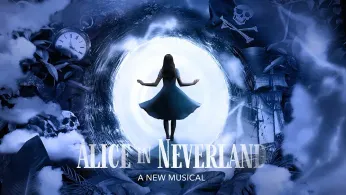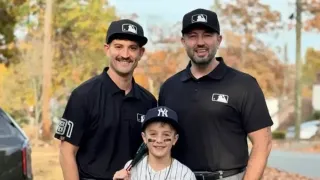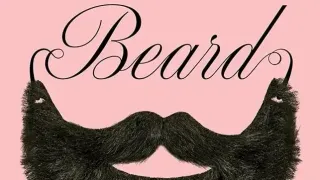
Nov 2
'Alice in Neverland' - A Queer Dreamscape for Theater Queens and Lost Boys Alike
READ TIME: 3 MIN.
There’s a new show brewing in New York that has theater queens buzzing with anticipation—and it’s not just because of its starry cast or its Tony-winning producers. Alice in Neverland, set for exclusive industry readings at the iconic New 42 Studios on November 6 and 7, 2025, is a musical fever dream: a sequel to Alice in Wonderland and a prequel to Peter Pan, daring to ask what happens when an iconic girl outgrows her storybook and tumbles into a world that refuses to let anyone grow up .
The creative pedigree alone would get any theater lover’s heart fluttering. Book, music, and lyrics are by Phil Kenny and Reston Williams, with direction from Catie Davis (Beetlejuice, Moulin Rouge) and choreography by Dominique Kelley (The Great Gatsby). The producing team reads like a Tony Awards afterparty: Hal Luftig and Kevin Connor (Kinky Boots, Legally Blonde), Jamie deRoy (Beetlejuice, Peter and the Starcatcher), and the ever-queer-friendly 42nd.club (Hadestown, & Juliet, Anastasia) .
If Wonderland and Neverland are queer-coded sanctuaries—places where the rules of gender and time don’t apply—then Alice in Neverland is a love letter to every LGBTQ+ person who ever felt out of place in the “real” world. Twenty years after her tumble down the rabbit hole, Alice is grown, world-weary, and wrestling with that existential question: Are my happiest days behind me? Instead of Wonderland, she’s whisked away to Neverland, where pirates, fairies, and the seductive promise of eternal youth swirl into a spectacle of self-discovery .
The musical doesn’t just deliver nostalgia; it interrogates it. For queer folk, the longing to reclaim lost childhoods—or to reimagine them with the freedom and magic denied by heteronormative expectations—hits especially hard. Alice’s journey is a reckoning with memory, time, and “the dangerous wish to never grow up,” a theme that echoes the perpetual coming-of-age that defines so many LGBTQ+ lives .
The readings for Alice in Neverland have already featured an array of Broadway talent beloved by LGBTQ+ audiences. Caitlin Houlahan, Nik Walker, Victor de Paula Rocha, Isabella Esler, and Donna Lynne Champlin lead the cast, with a supporting ensemble that brings together rising stars and queer icons alike .
And if you’re hoping for a show that understands the assignment on representation, you’re in luck. The creative team includes queer and allied talent who have left their mark on some of Broadway’s most inclusive productions. This is the same producing stable that brought us Kinky Boots (which gave us drag-queen realness on the Great White Way) and Hadestown (a favorite for its gender-expansive casting and visual storytelling) .
What makes Alice in Neverland more than a Broadway curiosity is its willingness to get messy with nostalgia. In a cultural moment when “chosen family” and “found worlds” are sacred concepts in LGBTQ+ life, the show’s premise—Alice, disillusioned and desperate to reclaim happiness, must confront the price of refusing to grow up—feels especially poignant. Is the fantasy of Neverland a utopia, or a trap? What does it mean to move forward when the world refuses to let you change?
This emotional core is set to a score described as “vibrant” and “full of wit, charm, and nostalgia,” promising everything from showstopping ballads to winking patter numbers—think Sondheim meets Elton John after a night at Marie’s Crisis .
For theater lovers who grew up dreaming of other worlds, Alice in Neverland is more than a ticket; it’s a testament to the power of reinvention. It’s no accident that both Wonderland and Neverland have long been claimed by queer creators, drag artists, and anyone who ever wanted to rewrite the rules. With its gender-fluid possibilities (hello, Peter Pan has always been a queer icon), playful subversion, and unapologetic embrace of the outsider, this musical is poised to become a new touchstone for LGBTQ+ audiences .
As the show moves from invite-only readings to the bright lights of Broadway, expect the buzz to get only louder. There’s already talk among insiders about how the production could open the door for even more explicitly queer retellings of beloved classics—a trend that’s long overdue and sorely needed on the main stage .
Whether you’re a theater queen, a lost boi, a drag duchess, or just someone who refuses to fit in a box, consider this your official invitation. Alice in Neverland is shaping up to be the kind of show that not only entertains but also affirms the wild, wonderful, and weird journey of being unapologetically yourself. In a world where growing up is overrated, this is one trip you don’t want to miss.
The only question left: Will you follow Alice through the looking glass—and over the rainbow—one more time?






